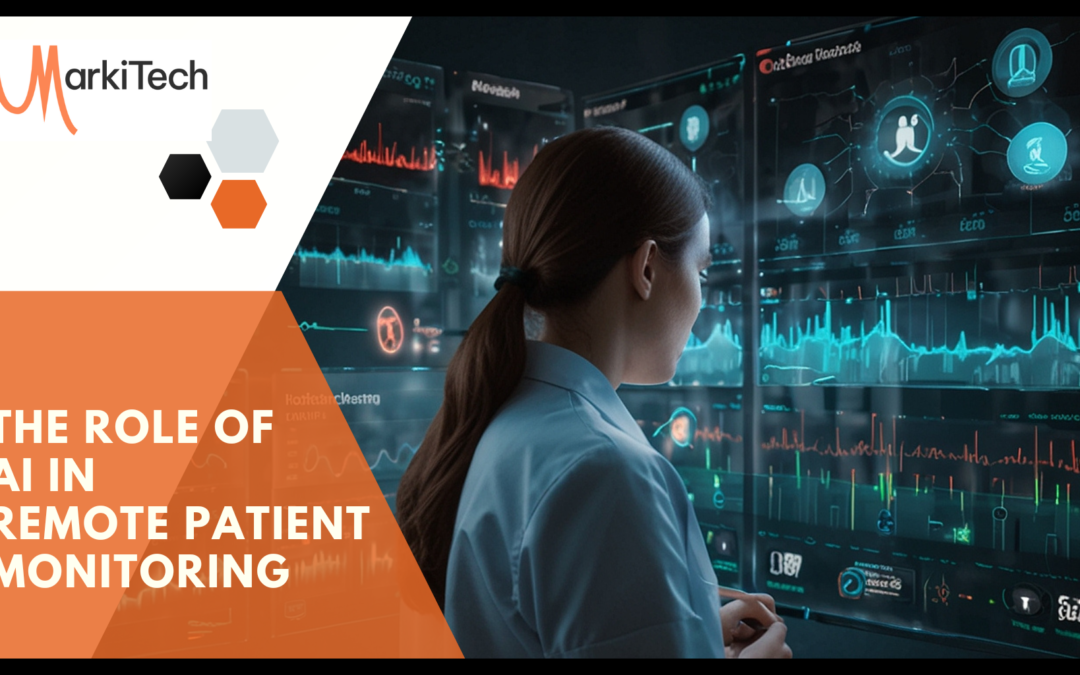What is Remote Patient Monitoring?
Remote Patient Monitoring (RPM) is a rapidly growing field that Utilizes technology to monitor patients’ health outside traditional clinical settings. The integration of Artificial Intelligence (AI) into RPM has taken this innovation to new heights, offering Countless benefits to both patients and Medical care providers. In this article, we will explore the role of AI in remote patient monitoring, its importance, examples of RPM devices, and the benefits it brings to healthcare.
The Importance of Remote Patient Monitoring
Remote Patient Monitoring is important in the Current healthcare environment, particularly as the demand for healthcare services continues to rise. RPM allows healthcare providers to monitor patients’ health conditions in real-time, providing timely measures and reducing the need for frequent in-person visits. This is particularly crucial for managing persistent conditions, post-surgery care, and ongoing supervision of elderly patients.
Why is Remote Patient Monitoring Important?
- Chronic Disease Management: Patients with chronic conditions like diabetes, hypertension, and heart disease require continuous monitoring. RPM enables healthcare providers to keep track of these patients, ensuring that any changes are detected early.
- Reducing Hospital Readmissions: By closely monitoring patients after they leave the hospital, RPM helps prevent complications that could lead to readmission, thus improving patient outcomes and reducing healthcare costs.
- Empowering Patients: RPM empowers patients to take an active role in their healthcare by providing them with real-time data about their health. This increased engagement can lead to better adherence to treatment plans and overall healthier lifestyles.
Examples of Remote Patient Monitoring Devices
RPM devices are the backbone of this technology, collecting and transmitting data to healthcare providers. With AI integration, these devices can analyze data, detect patterns, and even predict potential health issues on time.
Common Examples of RPM Devices:
- Wearable Devices: These include smartwatches and fitness trackers that monitor signs such as heart rate, oxygen levels, and physical activity. For instance, devices that utilize Photoplethysmography (PPG) and AI algorithms, like MarkiTech’s Veyetals, can measure vital signs by capturing light reflected by the blood vessels under the skin.
- Glucose Monitors: Continuous glucose monitors (CGMs) help diabetic patients track their blood sugar levels throughout the day, alerting them to any dangerous spikes or drops.
- Blood Pressure Monitors: These devices allow patients to measure their blood pressure at home and share the data with their healthcare providers for ongoing assessment.
- Smart Scales: These scales track weight and body composition, providing valuable information for managing obesity and heart conditions.
The Role of AI in Remote Patient Monitoring
AI enhances RPM by making the collected data more actionable. Instead of just collecting data, AI algorithms can analyze trends, predict health issues, and even suggest precautionary measures. Here’s how AI is transforming RPM:
- Predictive Analytics: AI can analyze vast amounts of patient data to identify patterns and predict future health events. For example, an AI system might detect changes in a patient’s heart rate that could indicate an Upcoming cardiac event, allowing them to take preventive measures on time.
- Personalized Care: AI enables RPM systems to develop personalized care plans for individual patients based on their unique data. This personalization leads to more effective treatment plans and better results.
- Automation of Routine Tasks: AI can automate routine tasks such as data entry and analysis, freeing healthcare providers to focus on more complex aspects of patient care.
Benefits of AI in Remote Patient Monitoring
The integration of AI in RPM brings a range of benefits that enhance the quality of care and improve healthcare efficiency.
- Improved Patient Outcomes: By providing continuous monitoring and predictive insights, AI-driven RPM helps in early detection and intervention, leading to better patient outcomes.
- Cost Reduction: RPM reduces the need for hospital visits and readmissions, reducing healthcare costs. AI further enhances this by optimizing resource allocation and streamlining operations.
- Enhanced Patient Engagement: AI-powered tools provide patients with personalized insights into their health, increasing their engagement and adherence to treatment plans.
- Scalability: AI allows healthcare providers to monitor large numbers of patients simultaneously, making RPM scalable and accessible to more people.
MarkiTech’s Innovations in AI and Remote Patient Monitoring
MarkiTech has been at the forefront of integrating AI into healthcare solutions, with a particular focus on remote patient monitoring and aging solutions. Their products are designed to help seniors age in place while providing caregivers with the tools they need to deliver high-quality care.
- Sensights.ai: This platform utilizes AI to monitor patients’ health in real time, ensuring that caregivers are always informed about their patient’s conditions. It provides a round-the-clock connection between caregivers and patients, making it an invaluable tool in elder care.
- Veyetals: MarkiTech’s Veyetals uses AI algorithms to measure vital signs anytime, anywhere, offering a convenient and reliable way to monitor patients remotely.
- CliniScripts: This Mental Health AI Scribe tool helps healthcare providers manage mental health documentation more efficiently, ensuring accurate and comprehensive records.
Conclusion
AI in Remote Patient Monitoring is transforming healthcare by providing continuous, personalized, and proactive care. The importance of RPM cannot be overstated, especially in managing chronic conditions, reducing hospital readmissions, and empowering patients. With the advancements in AI and the innovative solutions provided by companies like MarkiTech, the future of remote patient monitoring looks promising, offering better care for patients and more efficient operations for healthcare providers.
Interested in how AI is reshaping healthcare? Explore our other articles to stay informed and discover how these innovations can benefit you or your loved ones!





